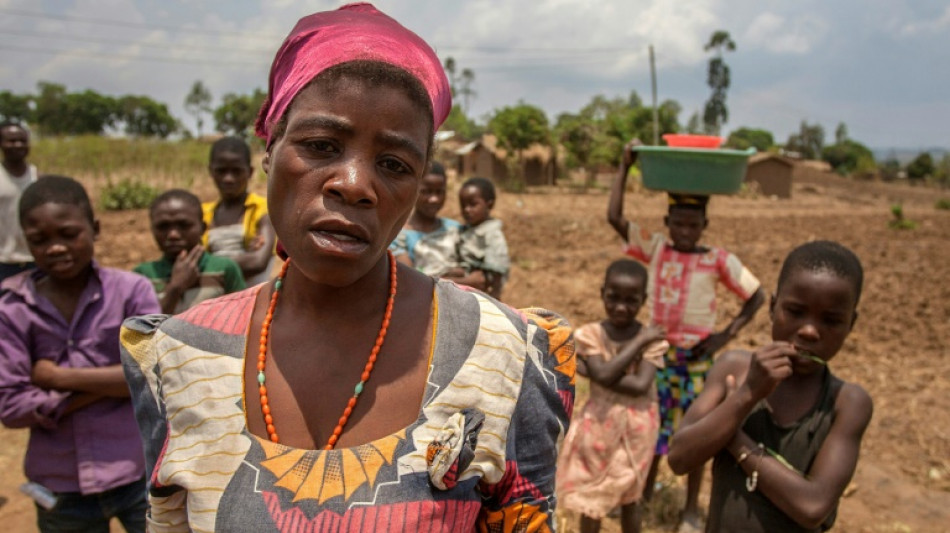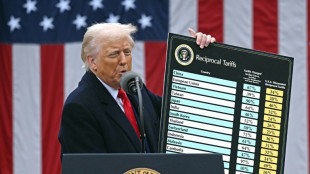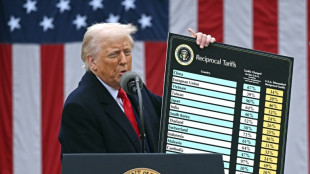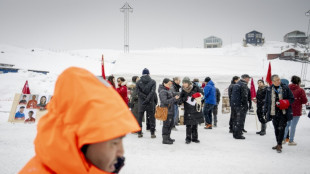
-
 Altomare hangs on to tie defending champ Korda at LPGA Match Play
Altomare hangs on to tie defending champ Korda at LPGA Match Play
-
Paraguay gold rush leaves tea producers bitter

-
 Health concerns swirl as Bolivian city drowns in rubbish
Health concerns swirl as Bolivian city drowns in rubbish
-
Syria says deadly Israeli strikes a 'blatant violation'

-
 Financial markets tumble after Trump tariff announcement
Financial markets tumble after Trump tariff announcement
-
Starbucks faces new hot spill lawsuits weeks after $50mn ruling

-
 Europe riled, but plans cool-headed response to Trump's tariffs
Europe riled, but plans cool-headed response to Trump's tariffs
-
'Shenmue' voted most influential video game ever in UK poll

-
 New coal capacity hit 20-year low in 2024: report
New coal capacity hit 20-year low in 2024: report
-
Revealed: Why monkeys are better at yodelling than humans

-
 Key details on Trump's market-shaking tariffs
Key details on Trump's market-shaking tariffs
-
'A little tough love': Top quotes from Trump tariff talk

-
 US business groups voice dismay at Trump's new tariffs
US business groups voice dismay at Trump's new tariffs
-
Grealish dedicates Man City goal to late brother

-
 US tariffs take aim everywhere, including uninhabited islands
US tariffs take aim everywhere, including uninhabited islands
-
Trump sparks trade war with sweeping global tariffs

-
 Israeli strikes hit Damascus, central Syria; monitor says 4 dead
Israeli strikes hit Damascus, central Syria; monitor says 4 dead
-
Slot 'hates' offside rule that gave Liverpool win over Everton

-
 US stocks end up, but volatility ahead after latest Trump tariffs
US stocks end up, but volatility ahead after latest Trump tariffs
-
Barca oust Atletico to set up Clasico Copa del Rey final

-
 Mourinho grabs Galatasaray coach's face after losing Istanbul derby
Mourinho grabs Galatasaray coach's face after losing Istanbul derby
-
Grealish strikes early as Man City move up to fourth in Premier League

-
 Reims edge out fourth-tier Cannes to set up PSG French Cup final
Reims edge out fourth-tier Cannes to set up PSG French Cup final
-
Liverpool beat Everton as title looms, Man City win without Haaland

-
 Jota wins bad-tempered derby as Liverpool move 12 points clear
Jota wins bad-tempered derby as Liverpool move 12 points clear
-
Inter and Milan level in derby Italian Cup semi

-
 Stuttgart beat Leipzig to reach German Cup final
Stuttgart beat Leipzig to reach German Cup final
-
Trump unveils sweeping global tariffs

-
 Italian director Nanni Moretti in hospital after heart attack: media
Italian director Nanni Moretti in hospital after heart attack: media
-
LIV Golf stars playing at Doral with Masters on their minds

-
 Trump unveils sweeping 'Liberation Day' tariffs
Trump unveils sweeping 'Liberation Day' tariffs
-
Most deadly 2024 hurricane names retired from use: UN agency

-
 Boeing chief reports progress to Senate panel after 'serious missteps'
Boeing chief reports progress to Senate panel after 'serious missteps'
-
Is Musk's political career descending to Earth?

-
 On Mexico-US border, Trump's 'Liberation Day' brings fears for future
On Mexico-US border, Trump's 'Liberation Day' brings fears for future
-
Starbucks faces new hot spill lawsuit weeks after $50mn ruling

-
 Ally of Pope Francis elected France's top bishop
Ally of Pope Francis elected France's top bishop
-
'Determined' Buttler leads Gujarat to IPL win over Bengaluru

-
 US judge dismisses corruption case against New York mayor
US judge dismisses corruption case against New York mayor
-
Left-wing party pulls ahead in Greenland municipal elections

-
 Blistering Buttler leads Gujarat to IPL win over Bengaluru
Blistering Buttler leads Gujarat to IPL win over Bengaluru
-
Tesla sales slump as pressure piles on Musk

-
 Amazon makes last-minute bid for TikTok: report
Amazon makes last-minute bid for TikTok: report
-
Canada Conservative leader warns Trump could break future trade deal

-
 British band Muse cancels planned Istanbul gig
British band Muse cancels planned Istanbul gig
-
'I'll be back' vows Haaland after injury blow

-
 Trump to unveil 'Liberation Day' tariffs as world braces
Trump to unveil 'Liberation Day' tariffs as world braces
-
New coach Edwards adamant England can win women's cricket World Cup

-
 Military confrontation 'almost inevitable' if Iran nuclear talks fail: French FM
Military confrontation 'almost inevitable' if Iran nuclear talks fail: French FM
-
US stocks advance ahead of looming Trump tariffs


Malawi's struggle with deadly witchcraft violence
The calm air cloaking Lupembe, a sleepy village on the sandy shores of Lake Malawi, conceals a dark secret.
On December 26 2019, a mob driven by rumours of sorcery hunted down and lynched a grieving family.
The killings are among dozens of witchcraft slayings that have shaken the southern African country, prompting talk of dramatic change to colonial-era laws on rumour-mongering.
"Hundreds of villagers descended on our home from all directions and started assaulting me, my brother and my parents," Walinaye Mwanguphiri, 36, told AFP.
Mwanguphiri said he made a lucky escape, but his parents and brother, as well as an aunt, were killed.
Belief in witchcraft in the southern African country is almost as widespread as its poverty -- nearly three people in four live on less than $2 a day, according to World Bank data.
Since 2019, mobs have killed at least 75 people suspected of dark magic, the Centre for Human Rights and Rehabilitation (CHRR), a non-governmental organisation based in the capital Lilongwe, says.
Only last week, local media reported that residents in Dedza, central Malawi, killed the village chief on suspicion he had used sorcery to murder his nephew.
In 2017, the United Nations was forced to pull out its staff from southern Malawi after at least seven people were killed as rumours about vampires swept the region.
- 'Recognising' magic -
Last December, a special commission tasked with drafting legal proposals to address the issue concluded that the best way around the problem was to acknowledge that magic is real.
Malawi's current laws assume that witchcraft does not exist. Under a law drafted during British colonial rule, it is a crime to accuse someone of witchcraft.
But since most Malawians believe in magic, the commission suggested it was better to recognise the existence of sorcery -- and make its practice a crime.
"People's beliefs cannot be suppressed by legislation," retired Supreme Court judge Robert Chinangwa, who headed the commission, wrote in his findings.
"The commission therefore recommends recognising the existence of witchcraft and states that the law must penalise all witchcraft practices."
CHRR director Michael Kaiyatsa says criminalising witchcraft could help prevent people from taking the law into their own hands to punish suspected sorcerers.
But securing convictions might prove tricky, he said.
"Witchcraft... is not something that you can see or prove," he said.
His group says killings caused by rumour-mongering have only rarely resulted in arrests and prosecutions.
It brands this a failure of law enforcement that has stoked a climate of impunity and fed the violence. It urges more action to bring killers to justice.
- Survivor's tale -
AFP this month visited Lupembe, which lies on a sandy shoreline of Lake Malawi near the border with Tanzania, some 550 kilometres (350 miles) north of Lilongwe.
Outwardly, the village of 700 souls showed little sign of the bloody episode of the recent past.
Men idled on a beach under the morning sun, waiting for a catch of sardines caught overnight to dry, while women washed dishes and clothes.
Inside his grass-thatched home, Mwanguphiri, the survivor, stuttered with emotion as he recounted his ordeal and how he felt to be living today among his family's killers.
The family, he said, had gathered at the village graveyard to bury his cousin's son, who had died after a short illness.
It was then that the mob descended on them.
They accused "us of killing (him) through witchcraft," he said.
Mwanguphiri said he managed to scrape his way through the crowd and ran for his life away from the village, leaving behind his elderly parents and brother, who were beaten to death.
"I survived by a whisker," he said.
The crowd destroyed his house, his brother's and that of his aunt before dispersing, he said.
Law enforcement officers rounded up a couple of villagers but later released them, he said.
The police did not respond to a request for comment.
To this day, Mwanguphiri does not know what triggered the deadly rumours.
After a year away, he returned Lupembe, where he now cares for his brother's five orphans.
"Although it is hard for us to live here after what happened, we have no other option because this is the only home that we know," he said.
"We have nowhere else to go."
L.Durand--AMWN